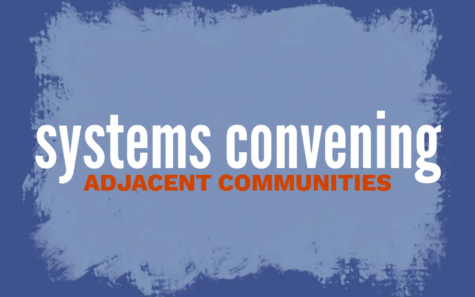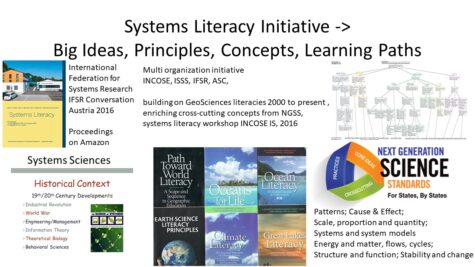The 125th meeting of Systems Thinking Ontario coincided with the closing day for the RSD13-RSDX online program. As a regular systems convening group, we’ve had monthly meetings since January 2013.
Zaid Khan moderated a discussion including me (David Ing), Tim Lloyd, Allenna Leonard, and Kelly Okamura.
We recollected starting as a spinoff from Design with Dialogue, adopting their tradition of meeting in a circle in the Lambert Lounge at OCADU. In the summers, we’ve celebrated the Synthesis Maps created by Master of Design students from the Strategic Foresight and Innovation program in the Visual Analytics Lab. The COVID-19 pandemic saw us shift to online meetings, with a few in-person opportunties taken in the summer.
This video recording is available for download, on Youtube, and also on the Internet Archive .
| Video | H.264 MP4 |
| October 21 (1h35m) |
[20241021_ST-ON_RSDx-RSD13_FHD_620kpbs.m4v (1920×1080 626kbps 538MB) [on the Internet Archive] |
An audio version was also created during the meeting.
| Audio | |
| October 21 (1h35m) |
[20241021_ST-ON_RSDx-RSD13.m4a] (126kbps, 88 MB) [on the Internet Archive] |
In 2025, Systems Thinking Ontario meetings are planned to continue. We’re shifting to a different evening, to enable inclusion of students currently in the SFI program. With an increase in the number of sessions where we’ll meet in person, we hope that novices will join our regulars. Stay posted at https://wiki.st-on.org.
The 125th meeting of Systems Thinking Ontario coincided with the closing day for the RSD13-RSDX online program. As a regular systems convening group, we’ve had monthly meetings since January 2013.
Zaid Khan moderated a discussion including me (David Ing), Tim Lloyd, Allenna Leonard, and Kelly Okamura.
We recollected starting as a spinoff from Design with Dialogue, adopting their tradition of meeting in a circle in the Lambert Lounge at OCADU. In the summers, we’ve celebrated the Synthesis Maps created by Master of Design students from the Strategic Foresight and Innovation program in the Visual Analytics Lab. The COVID-19 pandemic saw us shift to online meetings, with a few in-person opportunties taken in the summer.
This video recording is available for download, on Youtube, and also on the Internet Archive .
| Video | H.264 MP4 |
| October 21 (1h35m) |
[20241021_ST-ON_RSDx-RSD13_FHD_620kpbs.m4v (1920×1080 626kbps 538MB) [on the Internet Archive] |
An audio version was also created during the meeting.
| Audio | |
| October 21 (1h35m) |
[20241021_ST-ON_RSDx-RSD13.m4a] (126kbps, 88 MB) [on the Internet Archive] |
In 2025, Systems Thinking Ontario meetings are planned to continue. We’re shifting to a different evening, to enable inclusion of students currently in the SFI program. With an increase in the number of sessions where we’ll meet in person, we hope that novices will join our regulars. Stay posted at https://wiki.st-on.org.




